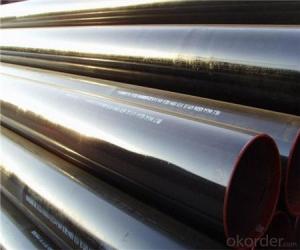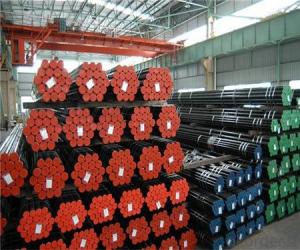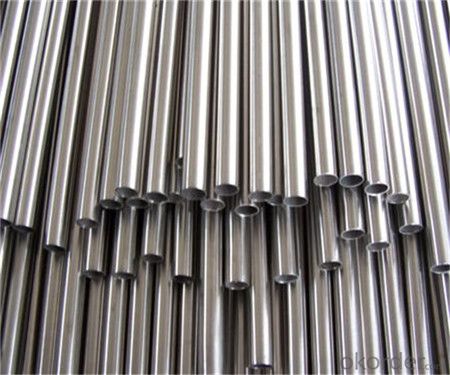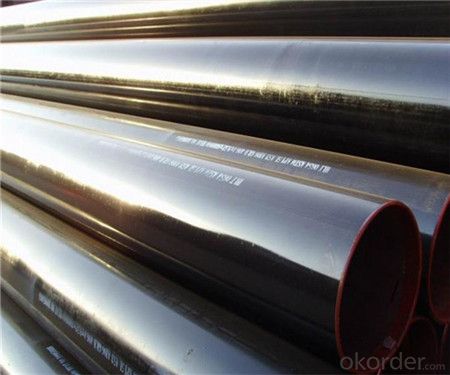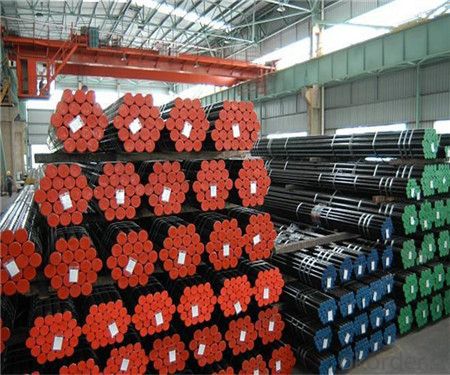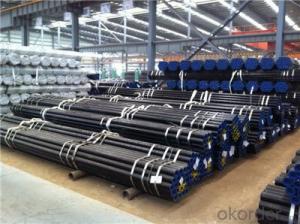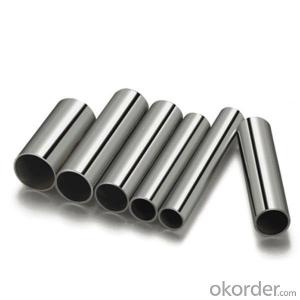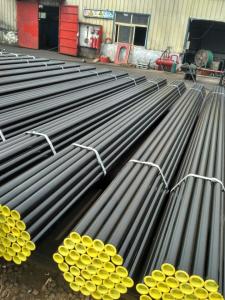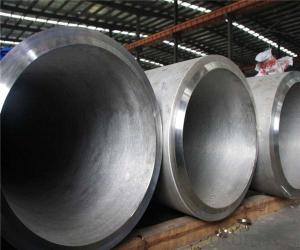Seamless Steel pipe Made in China from CNBM with High Quality
- Loading Port:
- Tianjin
- Payment Terms:
- TT OR LC
- Min Order Qty:
- 25 m.t.
- Supply Capability:
- 2000000 m.t./month
OKorder Service Pledge
OKorder Financial Service
You Might Also Like
1、Structure of High Quality Seamless Steel Pipe with Best Price Made in China:
Seamless pipe is formed by drawing a solid billet over a piercing rod to create the hollow shell. As the manufacturing process does not include any welding, seamless pipes are perceived to be stronger and more reliable. Historically seamless pipe was regarded as withstanding pressure better than other types, and was often more easily available than welded pipe.
2、Main Features of High Quality Seamless Steel Pipe with Best Price Made in China:
• High manufacturing accuracy
• High strength
• Small inertia resistance
• Strong heat dissipation ability
• Good visual effect
• Reasonable price
3、High Quality Seamless Steel Pipe with Best Price Made in China Specification:
Standard | GB, DIN, ASTM ASTM A106-2006, ASTM A53-2007 |
Grade | 10#-45#, 16Mn 10#, 20#, 45#, 16Mn |
Thickness | 8 - 33 mm |
Section Shape | Round |
Outer Diameter | 133 - 219 mm |
Place of Origin | Shandong, China (Mainland) |
Secondary Or Not | Non-secondary |
Application | Hydraulic Pipe |
Technique | Cold Drawn |
Certification | API |
Surface Treatment | factory state or painted black |
Special Pipe | API Pipe |
Alloy Or Not | Non-alloy |
Length | 5-12M |
Outer Diameter | 21.3-610mm |
Grade | 20#, 45#, Q345, API J55, API K55, API L80, API N80, API P110, A53B |
Standard | ASME, ASTM |
1) Material:20#(ASTM A 106/A53 GRB.API5LGRB,GB),45#,16Mn,10#.
2) Specification range:OD:21.3-610mm,WT:6-70mm,length:6-12m or according to the requirement of clients.
3) Excutive standards:GB,ASME API5L.ASTM A 106/A53,Despite of the above standards,we can also supply seamless steel pipe with standard of DIN,JIS,and so on,and also develop new products according to the requirements of our clients!
4) Surface:black lacquered,varnish coating or galvanized.
5) Ends:Beveled or square cut,plastic capped,painted.
6) Packing:bundles wrapped with strong steel strip,seaworthy packing.
4、Packaging & Delivery
Packaging Details: | seaworthy package,bundles wrapped with strong steel strip |
Delivery Detail: | 15-30days after received 30%TT |
5、FAQ of High Quality Seamless Steel Pipe with Best Price Made in China:
①How is the quality of your products?
Our products are manufactured strictly according to national and internaional standard, and we take a test
on every pipe before delivered out. If you want see our quality certifications and all kinds of testing report, please just ask us for it.
Guaranteed: If products’ quality don’t accord to discription as we give or the promise before you place order, we promise 100% refund.
②How about price?
Yes, we are factory and be able to give you lowest price below market one, and we have a policy that “ for saving time and absolutely honest business attitude, we quote as lowest as possible for any customer, and discount can be given according to quantity”,if you like bargain and factory price is not low enough as you think, just don’t waste your time.Please trust the quotation we would give you, it is professional one.
③Why should you chose us?
Chose happens because of quality, then price, We can give you both.Additionally, we can also offer professional products inquiry, products knowledge train(for agents), smooth goods delivery, exellent customer solution proposals.Our service formula: good quality+good price+good service=customer’s trust
SGS test is available, customer inspection before shipping is welcome, third party inspection is no problem.
6、High Quality Seamless Steel Pipe with Best Price Made in China Images:
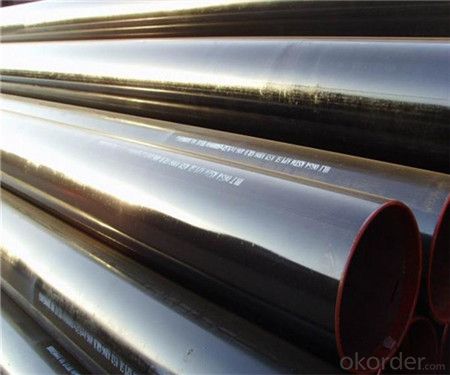
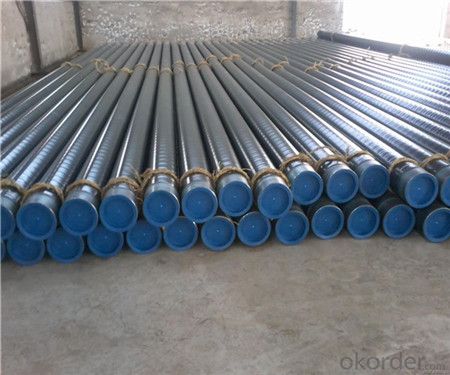
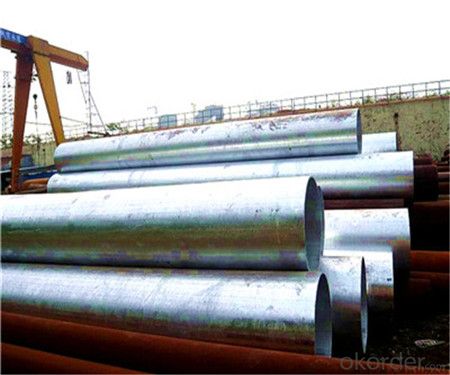
- Q: Can steel pipes be used for underground sewer systems?
- Yes, steel pipes can be used for underground sewer systems. They are commonly used due to their strength, durability, and resistance to corrosion, making them suitable for handling wastewater and underground installation.
- Q: What does "steel pipe SC" mean?
- SC (run in welded steel duitconSC is the line laying mode GB letter of wire is worn steel pipe laying (welded steel pipe, low pressure fluid) SC70 said the conductor by low pressure fluid DN70 welded steel pipe as protection pipe laying, DN70 said the nominal pipe diameter is 70mm, the nominal pipe diameter is 70mm (a series of values, the actual diameter slightly different).
- Q: Can steel pipes be used for marine applications?
- Yes, steel pipes can be used for marine applications. Steel pipes have high strength and durability, making them suitable for various marine environments and applications such as offshore drilling, shipbuilding, and underwater pipelines. The corrosion-resistant properties of steel pipes can be further enhanced by applying protective coatings or using corrosion-resistant alloys, ensuring their long-term performance in marine conditions.
- Q: What is the weight and strength of steel pipes?
- The weight and strength of steel pipes differ based on their dimensions and the specific steel grade utilized. Typically, the weight of steel pipes is measured in pounds per foot or kilograms per meter. The strength of steel pipes is commonly evaluated in terms of yield strength and ultimate tensile strength. The weight of steel pipes can range from a few pounds per foot for smaller sizes to several hundred pounds per foot for larger diameters and thicker walls. Various factors, including the pipe's outer diameter, wall thickness, and length, impact the weight. For example, a 1-inch diameter steel pipe with a wall thickness of 0.125 inches may weigh approximately 0.67 pounds per foot. Conversely, a 12-inch diameter steel pipe with a wall thickness of 0.5 inches can weigh roughly 142 pounds per foot. The strength of steel pipes is determined by the grade of steel used, which can vary depending on the specific application and requirements. Commonly used steel grades for pipes include ASTM A53 for general purposes, ASTM A106 for high-temperature service, and API 5L for oil and gas transportation. These grades possess different yield strengths and ultimate tensile strengths. Yield strength denotes the amount of stress a steel pipe can endure before it starts to deform plastically. It is usually measured in pounds per square inch (psi) or megapascals (MPa). For instance, ASTM A53 Grade B steel pipe has a minimum yield strength of 35,000 psi (240 MPa), while API 5L Grade X65 steel pipe has a minimum yield strength of 65,000 psi (448 MPa). On the other hand, ultimate tensile strength signifies the maximum stress a steel pipe can withstand before fracturing. It is also measured in psi or MPa. For example, ASTM A106 Grade B steel pipe has an ultimate tensile strength of 60,000 psi (415 MPa), whereas API 5L Grade X65 steel pipe has an ultimate tensile strength of 77,000 psi (531 MPa). In conclusion, the weight and strength of steel pipes can vary based on their dimensions and the grade of steel used. The weight is influenced by factors like the pipe's diameter, wall thickness, and length, while the strength is determined by the steel's yield strength and ultimate tensile strength.
- Q: Can steel pipes be used for desalination plants?
- Yes, steel pipes can be used for desalination plants. Steel pipes are commonly used in desalination plants to transport and distribute water, as they are durable, resistant to corrosion, and can handle high-pressure systems.
- Q: What is the difference between steel pipes and HDPE pipes?
- Steel pipes and HDPE pipes are both commonly used for various applications, but they differ in their composition and characteristics. Steel pipes are made from a combination of iron and carbon, offering high strength, durability, and resistance to extreme temperatures and pressure. They are commonly used in industries like oil and gas, construction, and plumbing. On the other hand, HDPE pipes are made from high-density polyethylene, a thermoplastic material known for its flexibility, corrosion resistance, and lightweight nature. HDPE pipes are often used in water supply and drainage systems, as well as for underground and aboveground applications. Ultimately, the choice between steel pipes and HDPE pipes depends on the specific requirements of the project, including factors such as cost, application, and environmental conditions.
- Q: What are the different methods of threading steel pipes?
- There are several methods of threading steel pipes, including manual threading, machine threading, and dielectric threading. Manual threading involves using a manual pipe threader or a handheld die to create the threads on the pipe. Machine threading, on the other hand, utilizes power-driven machines that can thread multiple pipes simultaneously, increasing efficiency and accuracy. Dielectric threading is a specialized method that uses a high-frequency electrical current to generate threads on the pipe, which is commonly used for stainless steel pipes.
- Q: Are steel pipes suitable for chemical processing plants?
- Steel pipes are commonly used in chemical processing plants due to their excellent strength, durability, and resistance to corrosion. Steel pipes, especially those made of stainless steel or alloy steel, can withstand high temperatures, pressure, and the corrosive effects of various chemicals. This makes them suitable for transporting and containing different types of chemicals in a safe and efficient manner. Additionally, steel pipes are easy to install, maintain, and repair, making them a cost-effective choice for chemical processing plants. However, it is important to select the appropriate type of steel and consider factors such as the specific chemicals being processed, the operating conditions, and any potential risks or compatibility issues. Regular inspections and maintenance are also essential to ensure the integrity and performance of steel pipes in chemical processing plants.
- Q: How are steel pipes used in the manufacturing of food and beverage processing plants?
- Steel pipes are commonly used in the manufacturing of food and beverage processing plants due to their durability, corrosion resistance, and ability to withstand high temperatures. These pipes are used for various applications such as conveying fluids, gases, and steam throughout the plant. They are also used in the construction of processing equipment, such as pumps, valves, and tanks. The smooth interior surface of steel pipes helps maintain the hygiene and cleanliness of the processing environment, ensuring the safety and quality of the food and beverage products.
- Q: What are the factors to consider when selecting steel pipes?
- Some factors to consider when selecting steel pipes include the intended application and environment, the required strength and durability, the size and thickness of the pipes, the corrosion resistance, the cost, and the availability of different types of steel pipes.
Send your message to us
Seamless Steel pipe Made in China from CNBM with High Quality
- Loading Port:
- Tianjin
- Payment Terms:
- TT OR LC
- Min Order Qty:
- 25 m.t.
- Supply Capability:
- 2000000 m.t./month
OKorder Service Pledge
OKorder Financial Service
Similar products
Hot products
Hot Searches
Related keywords

